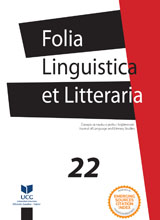LITERARY FICTION AND SCIENCES: THE CASE OF THE NOVEL
LITERARY FICTION AND SCIENCES: THE CASE OF THE NOVEL
Author(s): Bernard FrancoSubject(s): Comparative Study of Literature, French Literature, German Literature, 18th Century, 19th Century, Theory of Literature
Published by: Filološki fakultet, Nikšić
Keywords: novel; literary fiction and sciences; Goethe; Elective Affinities; Melville; Mardi; Flaubert; Bouvard et Pécuchet;
Summary/Abstract: The common sense builds a border between fiction and reality. Fiction may be represented by the novel, which is between the 18th and the 19th centuries mainly focussed to sentimental stories. The discourse about reality is generally represented by History and Science. Therefore, the border between fiction and reality has an equivalence, on one hand on the representation of the tree of knowledge in the Encyclopédie (science belongs to reason, history to memory and poetry to imagination), and, on the other hand, on the opposition between imagination and reason. German Idealism tried to recreate a union between the human faculties, imagination and reason, by unifying criticism and poetry. But novelists like Goethe (Elective Affinities), Melville (Mardi) and Flaubert (Bouvard et Pécuchet) tried in very different ways to unify poetry and scientific discourse in a literary project where knowledge becomes the main purpose of the novel. From the goethean ideal of universalism to Flaubert's irony about human aspiration to know, the three novels show different ways to question the relationships between fiction and scientific knowledge and lead to this question: in which way is there a part of human knowledge that can belong only to literature?
Journal: Folia Linguistica et Litteraria
- Issue Year: 2018
- Issue No: 22
- Page Range: 11-21
- Page Count: 11
- Language: English

